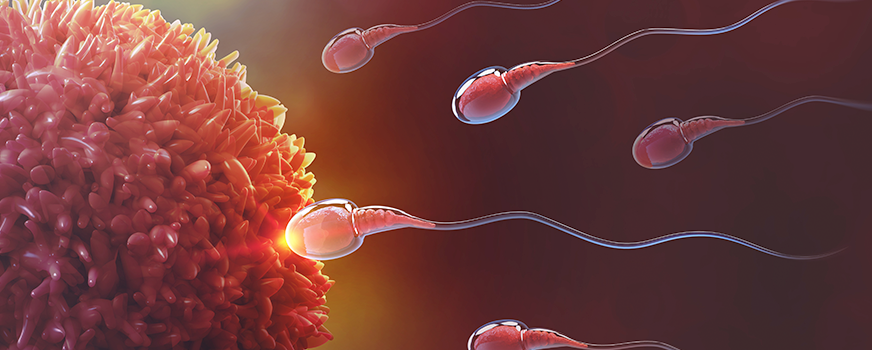
Struggling to get pregnant can lead to many stressful and sleepless nights, especially if you don’t know what could be causing it or which steps to take moving forward. Learn more about signs of infertility in men and women to ease your uncertainties and determine when to see a fertility specialist.
Signs of Infertility in Women
While not getting pregnant is the most obvious sign of infertility in women, there are other subtle symptoms to look out for. If you experience any of these female infertility symptoms, it may be time to seek out the advice of a fertility specialist.
Irregular Periods
The average woman’s cycle is 28 days long, with a few extra days still being considered “normal.” If you notice that your cycle is so irregular you can’t even begin to predict when you will start your next period, it’s time to make a doctor’s appointment. Irregular periods can be caused by hormonal issues or polycystic ovarian syndrome (PCOS), both being signs of infertility in women.
Pain During Sex
Up to 75% of women experience painful sex at some point in their life. While it’s not uncommon to feel pain during sex once or on a very rare occasion, regularly painful intercourse is not normal and may be related to infertility. Hormonal factors and endometriosis are just a couple health conditions that are associated with this female infertility symptom.
Hormone Changes
While your hormones change throughout the month and as you continue to age, there are certain hormone fluctuations that could potentially be a sign of infertility in women. If you experience any of these symptoms, talk to your doctor:
- Acne
- Dry skin
- Facial hair growth
- Reduced sex drive
- Rosacea
- Thinning hair
- Weight gain
Heavy or Painful Periods
Heavy bleeding and painful cramps are a common side effect that many women experience during their period, but it’s not something you want to completely disregard. If you suffer from painful periods that affect your daily life, you may be suffering from endometriosis which is a sign of infertility in women.
No Periods
Having periods is a healthy and normal process that’s a huge indicator of fertility health. Skipping a period every once in a while can be due to factors like stress or heavy workouts, which is completely fine. However, if you go months and months without menstruating, this can be a sign of infertility or other serious health conditions.

Signs of Infertility in Men
Men often get overlooked when it comes to infertility, but they play just as big of a role as women do. If female infertility symptoms don’t appear to be the culprit of your infertility struggles, pay attention to these signs of infertility in men that you may need to address with a doctor.
Problems with Sexual Function
There are a few different problems related to sexual function that can be a sign of infertility in men. If you or your partner notice any of these symptoms, it’s a good idea to get it checked out by a doctor.
- Difficulty with ejaculation
- Small volumes of fluid ejaculated
- Reduced sexual desire
- Difficulty maintaining an erection
Low Sperm Count
This sign of infertility in men is obviously impossible to discover unless seen by a doctor, but nevertheless, is an important factor to keep track of. A total sperm count of less than 39 million per ejaculate is considered low and may affect your ability to conceive.
Hormonal Abnormalities
Just as hormonal changes in women are a sign of infertility, the same goes for men. Decreased facial or body hair and abnormal breast growth (Gynecomastia) are just a couple symptoms to watch for.
Testicle Pain or Swelling
Pain and swelling in the testicles can be linked to many different health issues, some of them directly related to fertility health.
Small, Firm Testicles
Because sperm are held inside of the testicles, testicle health is a crucial factor tied to successful sexual reproduction. Small, firm testicles are a potential sign of infertility in men that should be examined by a doctor.

When to See a Fertility Specialist
After taking note of the signs of infertility listed above, you will also want to consider a few other factors to help you decide when to see a fertility specialist. Here are some of the biggest guidelines you should consider before deciding to take the next step and consult a fertility specialist.
12+ Months of Unprotected Sex
If you and your partner have been trying to conceive for 12 or more months (unprotected) and have yet to conceive, it’s a good time to get professional help.
You are 35+ Years Old
It’s no secret that getting pregnant becomes more and more difficult with age. That’s why women 35 and up who have been trying to conceive (unprotected) for six months should consider seeing a specialist. If you are 40 and up, you qualify in the high-risk pregnancy category, which means you should start your fertility journey by seeing a specialist right away.
Two or More Miscarriages
Miscarriages most often occur due to abnormalities in the fertilized egg or complications with egg implantation. However, there can be larger health issues that you aren’t aware of. If you experience two or more miscarriages, see a fertility specialist to rule out any conditions and ensure your body’s health.
Trying to get pregnant is an exciting and life-changing decision for both you and your partner. If you have been struggling with infertility, don’t give up. Do your research, stay in tune with your body, make a plan, and schedule an appointment to see a fertility specialist if any of the factors and symptoms previously mentioned apply to you.
As you start to educate yourself, take a look at our A-Z Fertility Glossary to learn all of the fertility terminology you’ll need to know as you begin your pregnancy journey.



